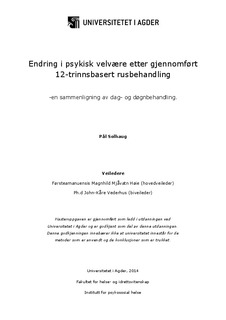Endring i psykisk velvære etter gjennomført 12-trinnsbasert rusbehandling : en sammenligning av dag- og døgnbehandling
Master thesis
Permanent lenke
http://hdl.handle.net/11250/221647Utgivelsesdato
2014Metadata
Vis full innførselSamlinger
Sammendrag
Background There has been an increasing focus on intensive outpatient treatment in drug rehabilitation. Through Government papers, the Norwegian authorities emphasize holistic and integrated services at the lowest effective level of care. And that the treatment of those with co-occurring substance abuse and mental disorders, which is defined out of dual diagnosis, must be strengthened. 12-step treatment is an internationally recognized therapy form treating alcoholism and substance abuse, but it is less focused on whether the treatment form contributes to improved mental health. Aims The study is based on 136 patients admitted to the unit for substance abuse- and addiction at Sørlandet sykehus, Kristiansand. We investigated whether patients in a 12-step based substance abuse treatment, experienced improvement in mental well-being, using the Outcome Rating Scale. An intensive outpatient unit is compared with an inpatient unit Method This is a naturalistic cohort study. It has two measurement points, before (T1) and after (T2) primary treatment. Results Patients in both groups had significant and clinically valid improvements in ORS with an average difference of 8.6 points for the inpatient group, and 10.5 points for the intensive outpatient group. Controlled for differences at T1, the intensive outpatient group had an average of 3.4 point higher ORS than the inpatient group at T2. Conclusion The results indicate that the intensive outpatient form should be continued, and that the 12-step treatment can be helpful for patients with co-occurring substance abuse- and mental disorders, that do not fall within the concept of dual diagnosis.
Beskrivelse
Masteroppgave i psykisk helsearbeid ME504 Universitetet i Agder 2014
